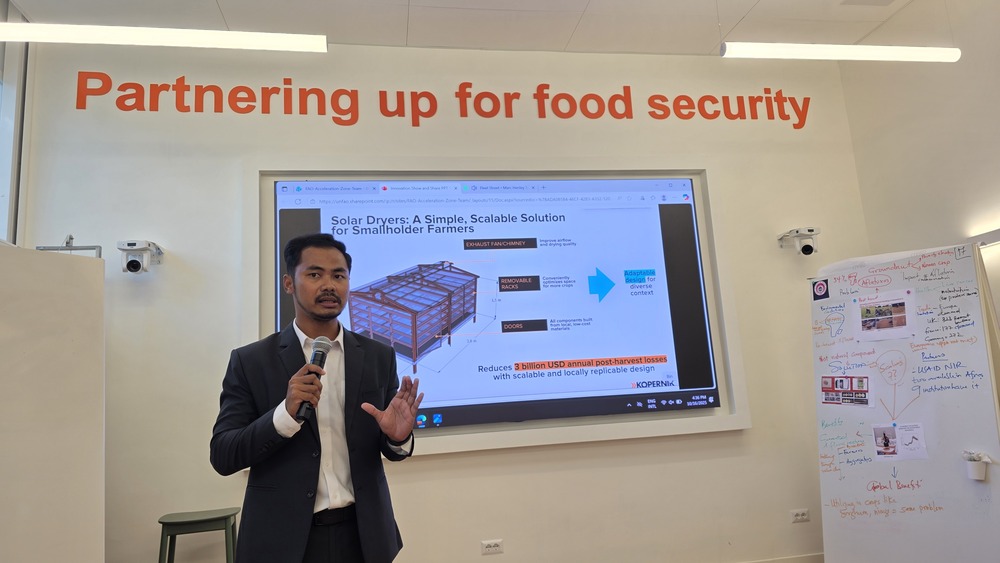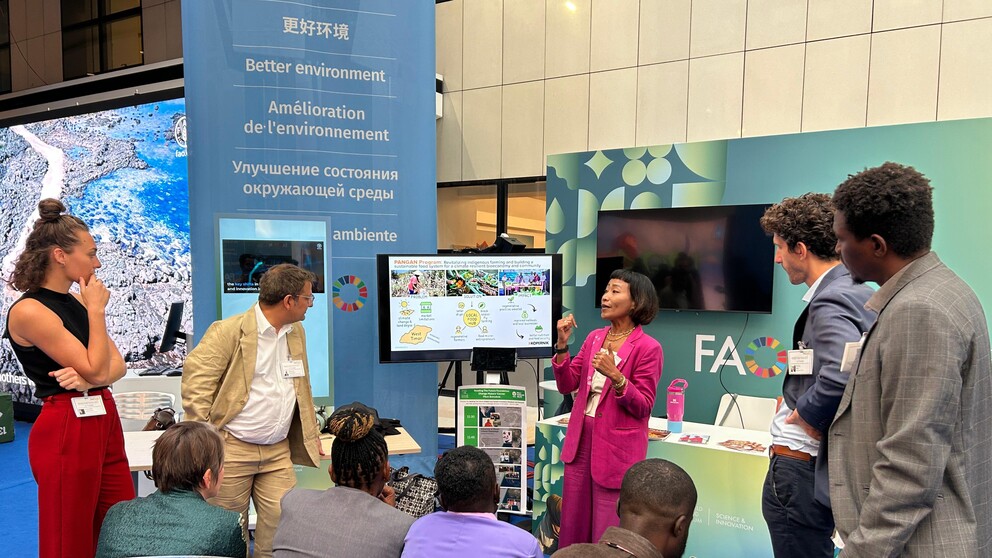Last month, in the week of World Food Day, Kopernik’s PANGAN Team participated in FAO’s World Food Forum, joining global efforts to advance food security and sustainable food systems. The forum provided a unique platform to share insights from our ongoing work in West Timor, where smallholder farmers face unpredictable weather, degraded land, and limited access to markets. For us, it was not only a chance to showcase innovation, but also to connect local experiences with global conversations on how food systems can be more regenerative, inclusive, and resilient.
Over the past several years, Kopernik has been working in West Timor to address food insecurity, a challenge closely linked to the growing impacts of climate change. Longer and more severe droughts, increased flooding, and frequent crop failures continue to threaten smallholder farmers’ livelihoods and limit access to nutritious food, contributing to chronic malnutrition and stunting.
Through the PANGAN Program, we work with health cadres and families with pregnant women and children under two years old to improve nutritional intake through local food utilization; with smallholder farmers to revitalize regenerative indigenous farming practices; and with micro-agribusinesses to build more environmentally friendly operations. Together, these efforts aim to strengthen local food systems by enabling producers and business owners to lead climate-resilient and economically viable practices.
 PANGAN holds regular learning sessions with smallholder farmers on regenerative indigenous farming practices, including polyculture, agroforestry, and practical skills like making organic compost and fertilizers.
PANGAN holds regular learning sessions with smallholder farmers on regenerative indigenous farming practices, including polyculture, agroforestry, and practical skills like making organic compost and fertilizers.
To date, PANGAN has been working closely with more than 250 smallholder farmers and micro-agribusinesses to promote food sovereignty by revitalizing Indigenous knowledge and regenerative farming practices, while introducing practical, low-cost innovations. One of the most visible and impactful solutions is the solar dryer. Across Indonesia, post-harvest losses remain a major challenge, with inefficient crop drying alone contributing to an estimated three billion US dollars in annual losses. When crops are dried on the ground, they are exposed to contaminants and unpredictable weather, resulting in reduced quality and value.
To help address this challenge, Kopernik developed and refined a simple yet effective solar dryer design. The solar dryer went through multiple prototypes, using locally available materials and accommodating local drying practices and food types. The technology harnesses the sun’s energy to dry crops more efficiently, safely, and cleanly. Its structure is intentionally straightforward: polycarbonate sheets trap solar heat, supported by frames made of wood, iron, or bamboo – materials that are affordable and accessible in rural communities.
What makes the solar dryer especially transformative is how farmers themselves have adapted it to fit their existing routines. Rather than changing how they hang their corn, they can now do so in a cleaner, safer environment. Many farmer groups have also organized to share dryers collectively and established small maintenance funds, demonstrating strong community ownership and sustainability without reliance on external aid. The solar dryer has proven to be low-cost, adaptable, and highly replicable – showing that even simple technologies can meaningfully strengthen climate resilience and reduce food loss.
 Gumilang Andika presenting at the “Innovation Show and Share: Ideas That Scale” session, highlighting how farmers have adapted and adopted the solar dryer to fit their local practices and needs.
Gumilang Andika presenting at the “Innovation Show and Share: Ideas That Scale” session, highlighting how farmers have adapted and adopted the solar dryer to fit their local practices and needs.
Beyond technology, the PANGAN Program continues to focus on improving nutrition and food value. Working with health cadres, we co-developed culturally relevant nutrition interventions and curated a Timorese Cuisine Cookbook that blends indigenous knowledge with innovative recipes using locally available ingredients. Workshops, recipe development, and cooking demonstrations and competitions help communities appreciate nutritious, local food while preserving cultural identity. Meanwhile, micro-agribusinesses – many led by women and youth – receive support to strengthen production practices, financial management, and marketing strategies, turning local ingredients into value-added products that improve livelihoods and contribute to the broader local economy.
Participating in the World Food Forum reaffirmed that transforming food systems requires collaboration across sectors, shifts in behavior, and solutions grounded in community ownership and culture. Sharing our experiences highlighted how innovation, local knowledge, and practical approaches can address pressing challenges while creating economic, environmental, and social benefits. It was encouraging to see that the work taking place in West Timor resonates strongly with global priorities around regenerative agriculture, circularity, and inclusive food systems.
Building on this potential, PANGAN’s next phase focuses on piloting the Local Food Hub, a community-driven, scalable model designed to strengthen the link between smallholder farmers, micro-agribusinesses, and local markets. We recognize that meaningful impact requires stronger market linkages; even the most promising innovations must create real economic value for farmers to ensure long-term sustainability.
 Sharing PANGAN’s Local Food Hub model at the Science and Innovation Forum Exhibition.
Sharing PANGAN’s Local Food Hub model at the Science and Innovation Forum Exhibition.
The Local Food Hub is expected to go beyond food distribution. It is designed to build a circular, community-based bioeconomy where every stage of the food system – from production to processing to distribution – generates social, economic, and environmental value. Through the hub, local crops gain added value through regenerative production; by-products are transformed into useful resources to reduce food waste; and community-based agribusinesses are strengthened to create jobs and fair markets. Three key actors will drive this transformation including regenerative farmers demonstrating the productivity and profitability of Indigenous practices; health cadres guiding families on nutrition and local food consumption; and micro-entrepreneurs who convert local harvests into value-added products. Together, we believe they can create a circular system where regenerative farming supports nutrition, and nutrition drives demand for local produce, building a positive cycle of income, health, and resilience.
Changing systems also requires creative engagement to shift mindsets and behaviors. At the World Food Forum, we highlighted how partnerships with comedians, content creators, and local campaigns are helping spark curiosity and pride in local ingredients, showing that cultural identity and food security can advance together. By aligning supply, demand, and knowledge, the Local Food Hub is laying the foundation for a resilient, inclusive, and economically viable food system rooted in indigenous, climate-resilient practices.
Sharing these insights at the World Food Forum allowed us to bring the lived experiences of farmers, health cadres, and micro-agribusinesses in West Timor into a global space where policymakers, researchers, and practitioners are shaping the future of food systems. It was an important moment to highlight how locally tested solutions – from indigenous regenerative farming to community-led nutrition initiatives – can offer practical pathways for broader transformation. The conversations at the World Food Forum echoed what we consistently observe in the field: meaningful, lasting change does not come from technology alone, but from cross-sector collaboration, everyday behavioral shifts, and solutions rooted in community ownership and cultural identity. Hearing similar reflections from global actors reaffirmed that the work taking place in West Timor aligns with global movements toward regenerative agriculture, circularity, equitable food systems, and centering local communities in driving change.
 Grateful to meet the Seeding The Future Global Food System Challenge 2025 grantees, and receiving this award for the second time enables us to bring PANGAN to its next phase, piloting the Local Food Hub.
Grateful to meet the Seeding The Future Global Food System Challenge 2025 grantees, and receiving this award for the second time enables us to bring PANGAN to its next phase, piloting the Local Food Hub.
We would not have reached this point without the unwavering support of Citi Foundation and Seeding The Future Foundation. Their partnership has enabled us to experiment, co-create, and test solutions alongside local communities — and to continue developing approaches that are locally rooted yet globally relevant. Together, we are advancing a shared vision of regenerative, inclusive, and circular food economies, working hand in hand with farmers, health cadres, micro-entrepreneurs, and communities for better food and a better future.


